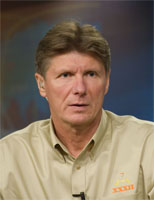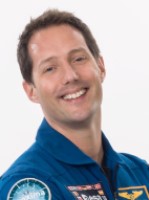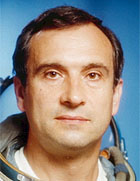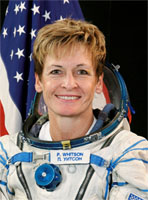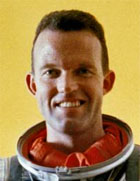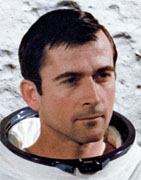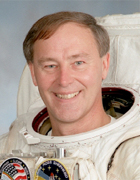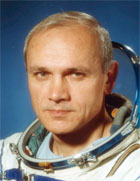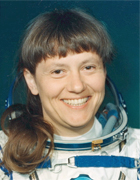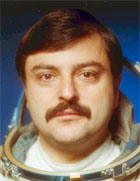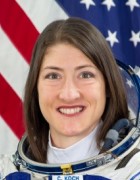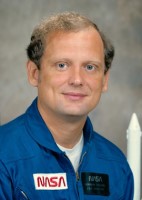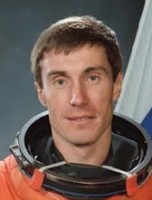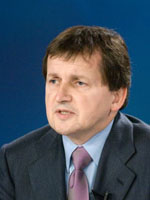The age of astronauts.
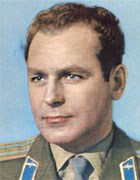
The youngest astronaut for 62 years remains the second
Soviet cosmonaut German Titov,
who first made a daily flight on August 6, 1961 at the age of
25 years 10 months 25 days.
In the first ten of the youngest cosmonauts 5 is the Soviet and 5 astronauts from the third
countries. In the first twenty - 10 Soviet, 9 astronauts from third countries and
American amateur astronaut Hayley Arceno.
On the 21st place is the first American woman astronaut
Sally Ride, which made its first flight on June 18, 1983, at
Shuttle crew Challenger STS-7
at the age of 32 years 23 days.
At the very old age, the first flight was made by American and Israeli space tourists:
Larry Connor at the age of 72 y 3 m 1 d,
Eytan Stibbe at the age of 64 y 2 m 27 d,
Denis Tito April 28, 2001 in
Soyuz TM-32 at the age of 60 years 8 months
20 days and Gregory Olsen October 1, 2005 in
Soyuz TMA-7 at the age of 60 years 5 months 11 days.
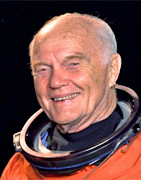
At the oldest age, the last (second) flight made
John Glenn October 29, 1998 in the shuttle
Discovery STS-95 at the age of 77 years 3 months 11 days.
Storey Musgrave made his sixth space flight
November 19, 1996 in the shuttle Columbia STS-80 at the age of
61 year 3 months.
The youngest female astronaut remains
Valentina Tereshkova June 16, 1963
in the Vostok-6 at the age of 26
3 months 10 days. In the oldest age made a space flight
Barbara Morgan August 8, 2007 in the shuttle
Endeavour STS-118 at the age of 55 years 8 months
10 days.
Lists of astronauts by age:
The first space flight at the age of less than 30 years was made by 13 cosmonauts.
The first space flight at the age of more than 55 years was made by 10 astronauts.
How many astronauts made the first space flights at different ages:
- 13 astronauts (2,09%) ≤ 30 years
- 30 years < 72 astronauts (11,6%) ≤ 35 years
- 35 years < 238 astronauts (38,20%) ≤ 40 years
- 40 years < 185 astronauts (29,70%) ≤ 45 years
- 45 years < 83 astronauts (13,64%) ≤ 50 years
- 50 years < 22 astronauts (3,53%) ≤ 55 years
- 55 years < 10 astronauts (1,61%)
Number of astronauts in space at the same time.
The first manned flight into space took place in 1961. Already in 1962, two astronauts went into space at the same time.
They were Andrian Nikolaev on the spacecraft Vostok 3 and
Pavel Popovich on the spacecraft Vostok 4.
In 1964, a crew of three cosmonauts went into space on the spacecraft Voskhod
: Vladimir Komarov, Konstantin Feoktistov
and Boris Egorov.
In 1965, there were already four American astronauts in space Frank Borman
with James Lovell on the spacecraft Gemini 7
and Walter Schirra with Thomas Stafford on
Gemini 6A. In October 1969, there were three spacecrafts in space at the same
time Soyuz 6, Soyuz 7 and
Soyuz 8 and seven cosmonauts: Georgy Shonin,
Valery Kubasov, Anatoly Filipchenko,
Vladislav Volkov, Viktor Gorbatko,
Vladimir Shatalov and Alexey Yeliseyev.
In the eighties, multi-seat American shuttles began to fly, in the crew of which up to 8 astronauts flew into space at the same time.
In February 1984, three Russian cosmonauts Vladimir Solovyov were at the Salyut 7 station,
Leonid Kizim and Oleg Atkov. At the same time in space
there was a shuttle Challenger STS-41B in the crew of which there were five astronauts
Vance Brand, Robert Gibson,
Bruce McCandless, Ronald McNair
and Robert Stewart. There are 8 people in space at the same time.
In April 1984, there were 11 cosmonauts in space at the same time: 6 cosmonauts Vladimir Solovyov,
Leonid Kizim, Oleg Atkov,
Yuri Malyshev, Gennady Strekalov
and Rakesh Sharma at the Salyut station 7 and 5 astronauts in the shuttle crew
Challenger STS-41C: Robert Crippen,
Francis Scobee, George Nelson,
James van Hooften and Terry Hart.
In December 1990, there were 12 cosmonauts in space at the same time: 5 cosmonauts Gennady Manakov,
Gennady Strekalov, Viktor Afanasyev,
Musa Manarov and Toyohiro Akiyama
at Mir station and 7 astronauts in the shuttle crew Columbia STS-35:
Vance Brand, Guy Gardner,
Jeffrey Hoffman, John Lounge,
Robert Parker, Samuel Durrance and
Ronald Parise. Until 1995, there were twelve astronauts in space three more times.
and astronauts at the same time.
In March 1995, there were 13 cosmonauts in space at the same time: 6 cosmonauts Alexander Viktorenko,
Elena Kondakova, Valery Polyakov,
Vladimir Dezhurov, Gennady Strekalov
and Norman Thagardat Mir station and 7 astronauts in the shuttle
Endeavour STS-67 crew: William Gregory,
Steven Oswald, Tamara Jernigan,
John Grunsfeld, Wendy Lawrence,
Ronald Parise and Samuel Durrance.
Until 2010, seven more times in space there were thirteen cosmonauts and astronauts at the same time. Shuttle flights ceased in 2011.
In 2020, the first manned flight Dragon took place, in which a crew of four astronauts flies.
Since 2021, two stations have been in space at the same time. The flight of the international space station continues, and
the flight of the Chinese space station Tiangong, on which astronauts have been constantly located since June 2022.
In September 2021, 14 cosmonauts and astronauts were in space at the same time. The ISS had a crew of seven astronauts
and astronauts: Oleg Novitsky, Pyotr Dubrov,
Mark Vandehei, Robert Kimbrough,
Megan McArthur, Tom Pesquet and
Akihiko Hoshide. There were three astronauts at the Chinese station:
Nie Haisheng, Liu Boming and
Tang Hongbo. Four astronauts joined them in space on September 16
the first fully private crew on the ship Dragon: Jared Isaacman,
Sian Proctor, Hayley Arceneaux and
Christopher Sembroski.
Later, there were 14 cosmonauts and astronauts in space three more times.
On May 30-31, 2023, 17 people were simultaneously in space for 25 hours.
There were 7 ISS crew members and four Ax-2 private crew astronauts on the ISS: Sergey Prokopyev,
Dmitry Petelin,
Francisco Rubio, Stephen Bowen,
Warren Hoburg, Sultan al-Neyadi,
Andrey Fedyaev, Peggy Whitson,
John Schoffner, Ali al-Qarni
and Ryan Barnawi. At the same time, a crew change was taking place at the Chinese station.
Departure Crew: Fei Junlong, Deng Qingming,
Zhang Lu and the next crew Jing Haipeng,
Zhu Yangzhu and Gui Haichao.
Number of astronauts in space at the same time.
Foreign cosmonauts on Russian spacecrafts.
Foreign astronauts on American spacecrafts.
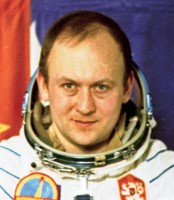
At the end of the 70s, as part of the Intercosmos program, flights of cosmonauts from socialist countries
began together with Soviet cosmonauts on Soyuz spacecraft and to the Salyut-6 orbital station. The first
cosmonaut not from the USSR or the USA was Vladimir Remek
from Czechoslovakia, who on March 2, 1978 went to the Salyut-6 station on the spacecraft
Soyuz 28.
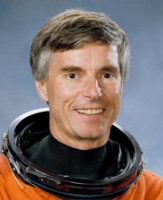
The first foreigner to go into space on November 28, 1983 on an American space
shuttle - Columbia STS-9 - was an astronaut from West
Germany Ulf Merbold.
50 foreign cosmonauts made the first space flight on Russian spacecraft. 9 of them made two flights
on Russian ships. 9 of them later also flew on American spacecrafts.
44 foreign astronauts made the first space flight on American spacecraft. 8 of them later also
flew on Russian spacecrafts.
Astronauts from other countries who made the first flight on American spacecraft.
Astronauts from other countries who made the first flight on Russian spacecraft.
Astronauts from other countries who flew on Russian and American spacecraft.
